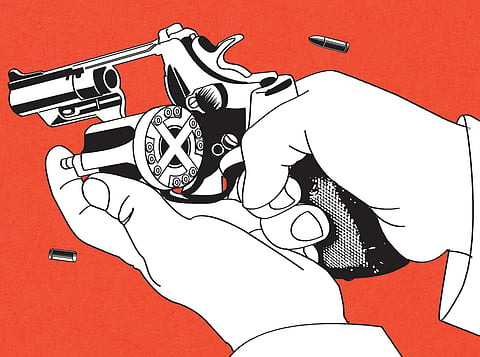

The time we are living through has been named ‘Amrit Kaal’ and most of us are content to rejoice in the blissful associations the compound word evokes—few have time or inclination to deconstruct the magic mantra.
It is the classic case of different strokes for different folks. The vibes can be more than distressing for the ungodly and sinful. In the dark age of Kali, amrit doesn’t automatically grant the boon of immortality or at least promise of a life free from wants and fear. Translating kaal can be terrifying. The Sanskrit word doesn’t mean only time or an age, but can also denote death, manifesting itself in fierce form to visit the victim unannounced. Remember the Kabir verse: “Panch mahal se le chala aisa kaal karaal.” Prince or pauper none is spared or can hide in a high palace or hovel when the time has come. Karma, we are reminded by our ancient texts encapsulating the wisdom of Puranas and the epics, catches up with sinner and pious alike sooner or later.
These thoughts have been stirring in our mind ever since some notorious criminals have been recently eliminated by way of what is euphemistically referred to as ‘extrajudicial executions’ by the literate, and in common parlance, encounters. As the Bhagavad Gita states bluntly, one who is born must inevitably die—jatasya hi dhruv mrityu. But, how one dies or is deprived of life is not easy to reconcile even with great philosophical erudition.
It can’t be denied that gangsters and mafia dons are rarely punished adequately, if at all, for the crimes they commit. Bringing them to book is almost impossible if they also wear the hats of politicians. The law has proverbially long arms, but these appear paralysed when a bahubali (strongman) is involved. The rich and the powerful enjoying political patronage can tamper with evidence, threaten witnesses and interfere with administration of justice in myriad ways.
The list is, indeed, long of villains-turned-protectors of their community, from Shahabuddin to Mukhtar Ansari and Atiq Ahmed. Lest this gives you the impression that criminalisation of politics is confined to one community, there has never been a dearth of gun-totting, sword- or axe-wielding protectors of the oppressed belonging to those who identify as Hindus. In Mumbai, ‘sons of soil’ like Atul Gawli and Chhota Rajan were propped up to get the better of Khans and Pathans in the gang wars. In Bihar, Pappu Yadav carved out turf for himself. The reign of terror unleashed by sandalwood smuggler Veerappan and ‘Bandit Queen’ Phoolan Devi couldn’t have lasted so long without political patronage. Except Veerappan and Chhota Rajan, all made successful forays in electoral politics.
These villains turned heroes by a gullible media glamourising them as modern-day Robin Hoods, agents of unorthodox social redistributive justice. Political parties—regional as well as national—haven’t been able to resist the temptation of using the sadistic goons as instruments in silencing opposition and securing vote banks. This is the reason that none—the SP, BSP, Congress and the BJP—can cast the first stone when slaughter takes place according to the script of a death foretold before dozens of TV cameras and reports in front of a crowd of blood-thirsty spectators baying for revenge, with assassins raising religious slogans.
Even the most dreaded outlaw has the right to a fair trial and protection of law while in custody. While the police at times is constrained to act in self-defence, and in larger public good, to engage in exchange of fire with desperadoes on the run, resulting in fatalities, the frequency of capital punishment meted out without any sentence pronounced by courts sends a shiver down the spine. The silence of the courts or their inability to intervene is scary. Anyone in power can apparently get rid of another with impunity, blaming rogue policemen, rabid vigilantes or vengeful members of the victim’s family who feel they have been denied justice by engineered delay.
Most disturbing is the manner in which some holding positions of responsibility and power have reacted to the recent gruesome incident. Concepts of crimes and punishments cannot be conveniently exchanged with paap and punya. Jungle Raj has no place in civilised society and any democracy where only rule of law can prevail.
Some declared fugitives who openly dare to challenge the unity and integrity of our nation manage to roam around freely even when chased by policemen in thousands across state borders. Ironically, one of them has amrit as part of his name. May be that is what explains the immunity he enjoys at least for the present. Samudra manthan in amrit kaal seems to be a strange churn yielding more poison than nectar.
Pushpesh Pant
Former professor, Jawaharlal Nehru University
pushpeshpant@gmail.com